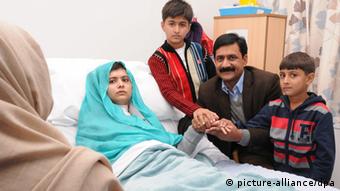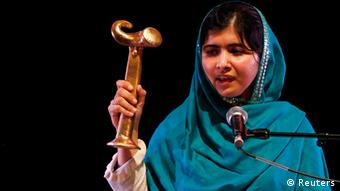M WAQAR..... "A man's ethical behavior should be based effectually on sympathy, education, and social ties; no religious basis is necessary.Man would indeed be in a poor way if he had to be restrained by fear of punishment and hope of reward after death." --Albert Einstein !!! NEWS,ARTICLES,EDITORIALS,MUSIC... Ze chi pe mayeen yum da agha pukhtunistan de.....(Liberal,Progressive,Secular World.)''Secularism is not against religion; it is the message of humanity.'' تل ده وی پثتونستآن
Thursday, October 10, 2013
Malala: a girl with a big story and bigger dreams
A year ago, 15-year-old girl was shot by a Taliban gunman. She survived and managed to take her campaign for girls' education international. And now Malala could soon become the youngest Nobel Peace Prize laureate.
The title of her book speaks for itself: "I am Malala: The Girl who Stood up for Education and Was Shot by the Taliban."
On the cover there is a portrait of the teenager wearing a headscarf. She has a serious expression on her face. On Tuesday, October 8, the autobiography of Malala Yousafzai was published - one year after she was attacked by the Taliban in her home town in Pakistan.
On October 9, 2012, Malala was on a bus heading home after school with friends. She had been well-known in her native Swat Valley and had been a thorn in the Taliban's side. The daughter of a teacher, she had openly advocated education for girls - despite a ban placed by the Taliban. On that Tuesday after school, a Taliban gunman stormed into the bus, asking, "who is Malala?" and shot her in the head.
At first, her condition was critical. Malala received an emergency operation after being flown to a military hospital in Peshawar. She was then transported to Islamabad for further treatment. Still in critical condition, she was flown to Britain, where she fought for her life for the next few months in hospital. Today, she lives there lives in Birmingham with her family.
Waking up as an icon
Thank God I'm not dead." Those were her first thoughts when she woke up from a coma around a week after the attack, Malala wrote in her book. She also wrote that she held no grudge against the man who shot her and that she did not want retribution.
International media cosely followed the recovery of the 16-year-old girl, who had turned into an icon - a symbol of the fight against Taliban oppression.
The Islamists admit that they had failed in their goal to silence her. And when Malala was able to address the UN nine months after her attack, she had a much larger stage than she or the Taliban could have ever imagined.
The young Pakistani woman is celebrated in the West; she has received a number of prizes for her dedication. Among others, she won the International Children's Peace Prize in September this year and was also named Amnesty International Ambassador of Conscience 2013.
After giving her speech on her 16th birthday before a specially convened youth assembly at the UN in New York in July 2013, she received an invitation from the Queen of England to visit Buckingham Palace. She has also been nominated for the Nobel Peace Prize, which will be handed out this Friday, October 11 and is seen as a favorite among the candidates.
Fans and foes
"If she wins, it is almost like we all are winning," said Gul Panrha, a girl in the sixth grade from Swat Valley. Fazal Khaliq, a teacher at Malala's school in Pakistan, said he was proud of his former student. "Because of what she suffered, she did something good for her country; Swat Valley used to be synonymous with terrorism." He added that Malala was to thank because the world now knew that the Swat Valley was also home to peace-loving people with an appreciation for education.
Not everyone in Pakistan, however, supports Malala. On the contrary: "after the attack, after she left the country and especially after she spoke before the UN, there has been a downright disgusting campaign against her," said Britta Petersen, head of the Heinrich Böll Foundation's Islamabad office. For months Petersen has observed mixed reactions among Pakistanis to Malala's campaign for girls' education - a very emotional topic for many. "Malala's father has been accused of instrumentalizing his daughter. He has been called a pimp and people have called her a 'whore of the West.'"
Utopian dream?
Ahead of the publication of her book, Malala Yousafzai gave an in-dept TV interview with the BBC. In it, she encouraged talks with the Taliban, saying they were "needed for peace."
"The best way to solve problems and to fight against war is through dialogue." She also said she wanted to return to Pakistan as soon as possible and get involved in politics. A goal that might prove unrealistic, said Britta Petersen.
"At the moment it looks as though one of the reasons Malala is living in Great Britain is because it is simply too dangerous for her in Pakistan." With regards to Malala's dream of returning to her home and having a positive impact on the future of the country, the expert added: "it's not very likely to happen."
Subscribe to:
Post Comments (Atom)




No comments:
Post a Comment